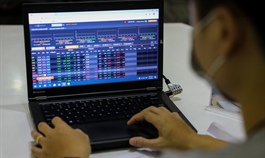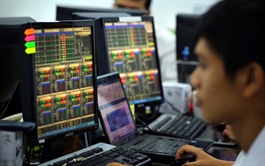New leap forward for stock market
New leap forward for stock market
The stock market in Vietnam will take an important step forward when Circular 120/2020/TT-BTC takes effect by 15 February, thereby allowing for intraday trading and short selling soon after the Tet Lunar New Year holiday season ends.
Illustrative photo.
|
Selling on same day
Since the stock market was established in Vietnam, there have been many changes in trading regulations. Previously, although the buyer had to pay the full cost immediately on buying shares, the buyer could hold the stock until T+3 to trade in the seller. After that, the regulation changed and T+3 was revised down to T+2, supporting increased liquidity and capital turnover for the market. From 15 February, Circular 120 will allow transactions in the afternoon to sell on the day they are bought in.
This new regulation frees buyers, because a decision to buy stocks sometimes incurs huge losses while waiting for stocks to recover. There can be a sudden instability in the general market or sudden changes in the stock market itself. Although the market has ceiling prices, when there is a sudden incident, as with the current T+2 regulation, from buying to selling, investors could lose more than 20% if they traded on the HSX and more than 30% on the HNX.
In the short term, according to Circular 120, investors need to sign a contract to open an account, or a sub-account, to manage and record daily transactions. Securities companies will choose which securities code can be traded T+0. Besides the fact that the investor must have enough money to pay, the securities companies must also ensure enough securities to be transferred within the payment day. T+0 trading depends on the equity of the securities company that investors are using. In addition to direct management and capacity of the securities company, the transaction of T+0 will not be possible within five working days before the last transaction date to exercise shareholder rights, or when SSC requests to stop T+0 trading in the context of stabilizing the overall market.
End of passive trading
After opening a short sale account, an investor is allowed to short sell listed shares and fund certificates. The stock codes are traded T+0 depending on the securities company, while the stock codes which are allowed to trade short first depend on the list announced by the SSC, then on the securities company that investors are trading.
Thus, not all stocks are allowed to buy and sell short, which is a form of trading in which the seller does not have to buy in first, does not need to hold the stock at the time of the transaction but still can join the selling side. This means the market supply and demand are untied for both the buyers and the sellers. Buyers can sell out right after assessing stocks that are no longer attractive, and sellers can also jump to increase supply at any time, ending the period of one-way passive trading, which has many disadvantages for retail investors.
Short selling helpful
If you look at the VN Index which is currently hovering above 1,000 to 1,200 points, T+0 seems smaller than the appearance of short-sellers. However, from a different perspective, the short sellers are the force that help increase demand when they take profits or cut losses. From there, the strong support points of stocks will increase demand, and in the medium and long term, it creates the basis for sustainable growth. It can be said that short selling will support a lot of stocks with good fundamental intrinsic and long-term growth trend. Without short selling, it is very difficult for the market to grow in the long term, which usually is going up and down.
Another very obvious benefit that T+0 trading and short selling brings in is to help increase market liquidity. Although recently, the regular trading system did not respond when the liquidity reached beyond VND 16,000 bn. This continual rise could be a new challenge when a more advanced trading system can be put to use by the end of 2021. However, short selling, in addition to benefits for good fundamental stocks in the long term, is a threat to hot-growing stocks, hotter than fundamental factor gains, and growth in the short term, because short selling calls for always hunting a prey.
Short selling is really helpful in keeping cash flow in the market. There were times when the market surged close to 1,200 points, and it was difficult to find few good stocks with the right price to open a position. Therefore, experienced cash flow often rejects hot profits, goes out of the market to wait for the adjustment process and for another time. The reason is also because they can only participate in buying, while they are passive in the selling due to the T+2 regulation and short selling. This often causes liquidity to decline when prices rise.
Although there has not been aggressive short selling, like in developed markets, short selling is guaranteed to support not only retail investors, but also the market maker, especially securities companies, and self-employed blocks to increase services to develop profits. Besides, short selling is also a challenging financial service for risk management in securities companies. Since the margin of short-selling is unlimited, a stock that goes down the maximum can only drop to zero, or cancel listing. While on the upside, for example with shares of Apple and Tesla, the losses for short sellers are boundless.


























